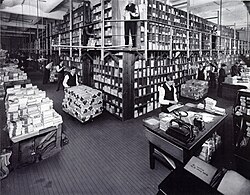Street & Smith's

Street & Smith book department in 1906
|
|
| Status | defunct (1959) |
|---|---|
| Founded | 1855 |
| Founder |
Francis Scott Street Francis Shubael Smith |
| Successor | Condé Nast Publications |
| Country of origin | United States of America |
| Headquarters location | 79 Seventh Avenue, Manhattan |
| Key people | Ormond Gerald Smith |
| Publication types | Paperbacks, Magazines, Comics |
| Nonfiction topics | Sports |
| Fiction genres | Pulp magazines |
Street & Smith or Street & Smith Publications, Inc. was a New York City publisher specializing in inexpensive paperbacks and magazines referred to as dime novels and pulp fiction. They also published comic books and sporting yearbooks. Among their many titles was the science fiction pulp magazine Astounding Stories, acquired from Clayton Magazines in 1933, and retained until 1961. Street & Smith was founded in 1855, and was bought out in 1959. The Street & Smith headquarters was at 79 Seventh Avenue in Manhattan; it was designed by Henry F. Kilburn.
Francis Scott Street and Francis Shubael Smith began their publishing partnership in 1855 when they took over a broken-down fiction magazine. They then bought the existing New York Weekly Dispatch in 1858. Francis Smith was the company president from 1855 until his 1887 retirement; his son Ormond Gerald Smith taking over his role. Francis Street died in 1883. Francis Smith died on February 1, 1887. The company who owned a six story building at 79 Seventh Avenue (just above 14th Street) became a publisher of inexpensive novels and weekly magazines starting in the 1880s and continuing into 1959. In the early decades of the 20th century, Ormond V. Gould was the company secretary. Ormond Smith remained company president until his death in 1933.
In 1933, Street & Smith bought titles from Clayton Magazines, including Astounding Stories. In 1934 they put out 35 different magazines, looked after by about a dozen editors including John Nanovic, Frank Blackwell, Daisy Bacon and F Orlin Tremayne. The company paid one cent a word, which was standard base rate amongst the major groups though fringe publishers paid less. In 1937, Street & Smith discontinued a number of their pulp titles, including Top-Notch and Complete Stories, the start of a long-term shrinking of their pulp line. In 1938, Allen L. Grammer became president. He had spent more than twenty years as an ergonomics expert for Curtis Publishing Company, and made a small fortune inventing a new printing process. He moved the offices into a skyscraper.
...
Wikipedia
